Cultural immersion as the antidote to ‘hit and run’ tourism
Travelling deeper, rather than further
This is a follow-up to my last newsletter, ‘Do any of us really know how to travel?’, which explores travel consumerism and how we’ve become more accustomed to consuming a place through leisure activities rather than actually experiencing a place and getting to know a new culture. This piece expands on that and shares some tips from my own travels.
There have been times in conversation when a friend tells me something about their past and they literally transform before my eyes. Have you ever experienced that? Someone tells you about an issue they’re dealing with or about an unexpected interest or past achievement, and you suddenly start seeing them differently. You think back on previous conversations and start reframing them - a moment when you thought they were being rude was actually anxiety. Or maybe someone you perceived as shy is actually quietly confident and a lot stronger than you believed. Backstory transforms. It gives us the context that allows for greater appreciation and understanding of the person standing in front of you.
Well, places are exactly the same. The backstory we have of somewhere entirely shapes how we see and experience it. The issue is the way we travel now often involves travelling without any backstory at all. Or we’re travelling with the wrong story; one that’s been told by other tourists rather than the people who live there.
The first time I travelled to Thailand, I didn’t do any research into the culture or history. My excuse is that I was young and very inexperienced at travelling. All I researched were parties and beaches. We heard Khao San Road was the place for travellers in Bangkok, so that’s where we stayed. We went to a few temples and markets, but other than that, I didn’t really see much. I mean that in both senses of the word. I didn’t geographically see much else of the city, but I also wasn’t really seeing the city. It was like looking at words on a page but not taking in any meaning or reading between the lines. I couldn’t see beyond the ‘tourist gaze.’
When I returned to Bangkok last year, I had an entirely different experience. This time, before I travelled, I did far deeper research. I learned about its creative resurgence after young Thai creatives returned from living overseas during Covid and started to build their own businesses. I learned how it's rapidly developing in a quest to become the next Singapore and how it’s currently riding a ‘T-Wave’, the term used to describe its recent creative and cultural emergence. I learned that the culture has a strong Indian and Chinese influence. I did a deeper dive into the different neighbourhoods and communities that reside in them. Going there with this knowledge felt like I was travelling in a completely different place from before. The backstory transformed what I was seeing and took me beyond the typical tourist hotspots. In fact, I didn’t see many other Western tourists where I was staying or encounter the scams I’ve heard other people complain about since.
During my trip, I read Another Bangkok by Alex Kerr, a non-fiction book that explores the culture and history of Bangkok. As an arts and culture expert with decades of experience living in both Japan and Thailand, the author drew some interesting comparisons between the two. According to Kerr, the two cultures are more similar than we would think; in some ways, Thailand is actually more modern. Yet for many of us, this might come as a surprise. Despite Thailand being a popular tourist destination (Bangkok is the most visited city in the world), we know very little about Thai culture. If you asked someone what they associate with Japan, they might say sushi, cherry blossoms, geishas, sumo wrestling, anime, tea and other cultural elements. If you asked the same question about Thailand, you would likely get beaches, parties, backpackers and sex (interestingly, Kerr shared that Japan has a far larger sex industry, but for some reason most turn a blind eye to this). The things we associate with Thailand are so intertwined with tourism that we don’t know Thailand’s story without it. Our perception has been entirely shaped by foreigners. This lack of cultural awareness has caused a lack of respect, evidenced by the hordes of badly behaved and poorly informed tourists.
“In Japan, bookshelves sag under the weight of books in English about ceramics, ikebana, gardens and the ways of thinking that have inspired them. People come to Japan on bended knee, eager to soak up the Zen wisdom of tea ceremony. You don’t find this in Thailand, and it’s because Thailand is mostly seen from abroad as a place for fun and relaxation, shopping and the beaches. Few would imagine the existence of a rich traditional culture from which you could learn something of value.” Alex Kerr
So how do we really experience a place with depth? While an obvious answer would be to slow down and immerse yourself in nature, I think cultural immersion is what’s really missing from modern-day tourism. In Emiko Davies' Substack on overtourism in Florence, one of the major complaints about travellers is how they engage in ‘hit and run tourism,’ arriving for very brief visits to tick off bucket list items and viral social media spots to take photos for their own Instagram, rather than arriving with the intention of genuinely engaging with the people and culture.
While I agree this is an issue, I also don’t want to pin all of the blame on tourists. The tourism industry encourages this sort of behaviour by prioritising growth and profit above all else. And as a tourist, it also isn’t easy getting to know a completely new place when you have limited time. Culture is so intangible too - how do you get to know something that sometimes isn’t even obvious to the people inside of it? For me, this is where forming some sort of backstory before and during your travels comes in. I’ve shared a list of some of the ways I do that below, but be warned - this is quite an extensive list and some points won’t apply to all destinations. I also wouldn’t recommend trying to apply all of these to a trip, otherwise you will go crazy. Enjoy!
Map the area out

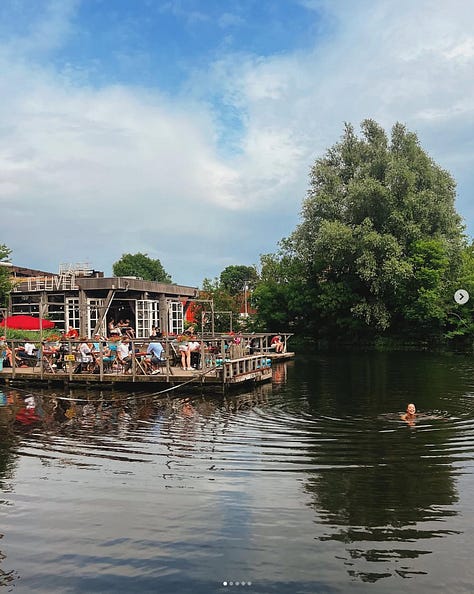

For cities, I like to spend a bit of time researching the different neighbourhoods before I go for several reasons. I usually feel that the central part of any city is the worst part, so it helps me move away from the typical tourist areas and find an area that best suits my vibe and my interests. In Amsterdam, this led me to an up-and-coming neighbourhood on the other side of the river; in Paris, it led me to a multicultural neighbourhood full of quiet coffee shops and some of the best Asian food I’ve ever had. The bonus of this research is that it also provides greater social context as you end up discovering why the neighbourhood has been shaped this way, i.e. through migration, current trends, politics, etc. Once I have a better understanding of the different neighbourhoods, it really helps with my sense of place when moving around the city too.
Research different communities

There are always going to be groups of people who are missing from the mainstream tourist narrative and I’m usually curious to know who that is. In many European countries, the largest minority groups will come from former colonies, i.e. India and Jamaica in the UK; Cape Verde and Angola in Portugal; and Morocco, Algeria, Senegal and the French Caribbean in France. Learning about this when I’ve visited places such as Lisbon, Amsterdam and Paris has expanded my historical knowledge and given me a better overview of the city so I’m not just seeing the one version of it. Plus, it’s opened me up to some incredible food, such as Indonesian and Surinamese dishes in Amsterdam.
Book a tour guide
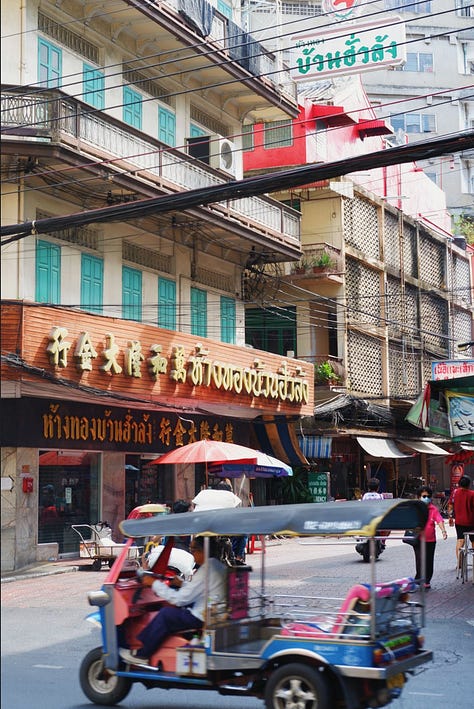
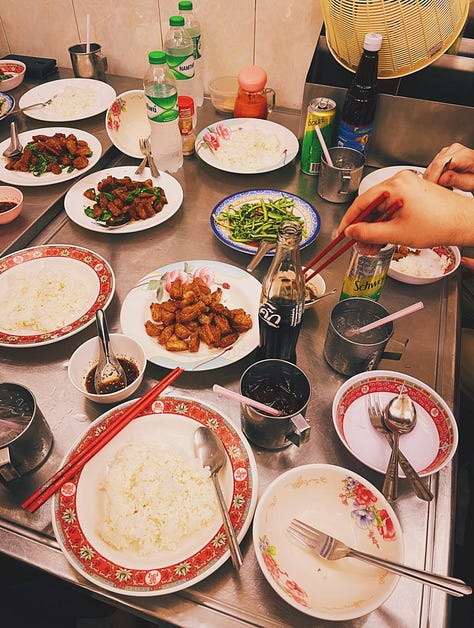

This has been one of the biggest changes to the way I travel since studying responsible tourism. Information from blogs, TikTok and Instagram can only get you so far. If you really want to get to know somewhere on a deeper level, you need someone local with passion and knowledge to provide it to you. It’s now possible to travel somewhere without any local engagement at all, by staying in an Airbnb with no staff and navigating by yourself using your phone and places you’ve saved from other tourists. Booking a tour experience is the easiest way to get that backstory that transforms what you’re seeing and takes you beyond the tourist traps. Plus, it’s putting money directly into local hands. Spending locally is more of a grey area than you would expect (perhaps another post for another day), so if you want to support the local economy, this is one of the best ways to do it. Some of my best experiences have included a deep exploration of Bangkok’s disappearing Chinatown and a walking food tour of Queens, NYC, discussing politics, migration and Latin American culture with Culinary Backstreets (who also do a tour of Lisbon’s post-colonial kitchens that sounds excellent).
Explore local food





This might seem like an obvious one, but it surprises me how many people stick to Western foods when they travel (I once knew someone who spent a month in Thailand and only ate crisps the whole time she was there, which pains me). Food isn’t just food - it’s an entry point into a way of life, family traditions, local spices and ingredients, and recipes shaped by history. Booking a food tour at the start of the trip is my favourite way to sample a variety of dishes and get familiar with how/where to order and what to avoid as the guide provides invaluable insights. Seeking out local dishes is going to be better for the local economy too. You’re more likely to be supporting small businesses with connections to the community, rather than trendy venues that have been backed by investors.
Explore art, architecture and creative practices


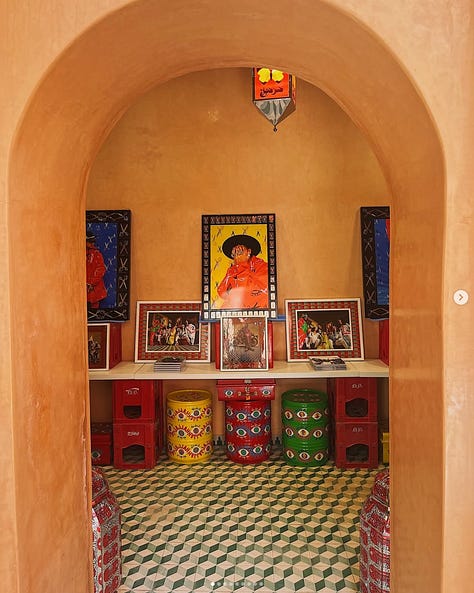
Art - in all its various forms - has become my favourite way to get to know and form a deep appreciation for a new culture. It’s art that reveals the unique personality of a place; the coloured tiles of Portugal, the handwritten shop signs in Jamaica, the Art Deco-inspired graphic design seen around Paris, the architecture of Palm Springs, the textile and ceramic traditions in Morocco. Pay attention to these differences and get curious about them. Reading about Thai art in Another Bangkok during my trip altered my perspective of what I was seeing. I noticed the rooftops on the older buildings would curve upwards to protect from bad spirits. A temple that I might have previously thought of as garish now made sense after reading that Thai art embraces fantasy and outlandishness. It almost brought me to tears because I was so in awe of the level of detail that had gone into it. I couldn’t believe some people just came in, took a selfie and left almost immediately. Don’t forget modern-day artists either. The creative scene will be full of artists who are both celebrating and challenging their city/country, with work that provides an insight into its identity and struggles. Do some research before you go to see if they have any projects on while you’re visiting. (Here’s one of my faves from a trip to Marrakech.)
Follow your interests

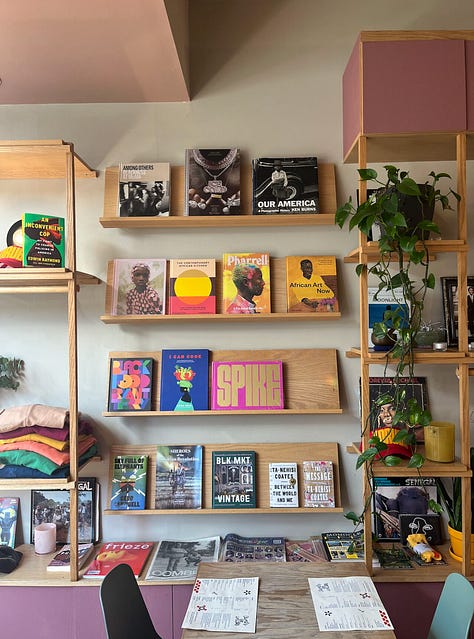

My friends often tell me that I’m good at finding cool places when I travel, but it’s mostly because I follow the things that interest me rather than the things I “should” be doing. It doesn’t make sense to visit somewhere you would have no interest in at home, just because it’s part of a tourist checklist. Think about the things you’re interested in and seek them out to see how they translate in a different culture. If you’re a very spiritual person, perhaps there are interesting spiritual practices and traditions that you can learn in this new place. If you’re an environmentalist, perhaps there are eco-events or community groups where you can go and meet like-minded people, swap tips or gain inspiration for your activism back home. Not only will it make your experiences more meaningful, but you’re more likely to have genuine interactions with local people who you can connect with too (it’s led me to meeting a local entrepreneur in NYC and a gallery owner in Bangkok).
Read, watch and listen before you go

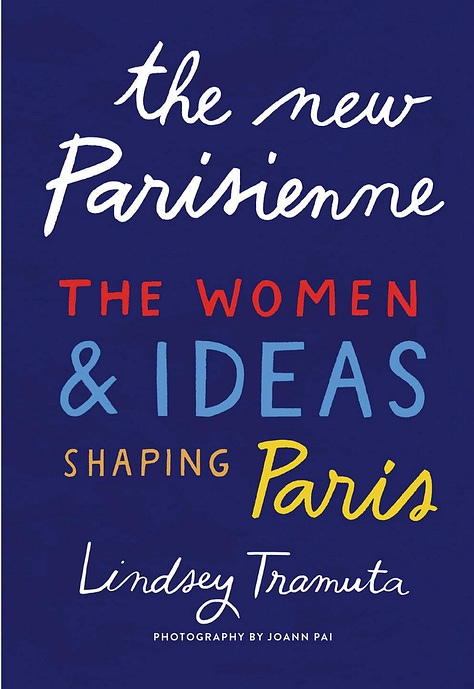

I love a destination deep dive before I travel through books, magazines, documentaries, films, podcasts and music. This one's fairly self-explanatory; my only tip would be to try and make sure you’re hearing the stories from a local perspective or a cultural expert if possible to avoid romanticised stereotypes, i.e. watching Emily in Paris vs watching a French-made show that actually reflects the people who live in the city.
Try local sports



Sports are deeply tied to a country’s identity and community. If you live in England, this needs no further explanation when you consider how deeply ingrained football is within the culture. Trying a local sport is one of the best ways to connect with a new place, as it will usually involve genuine interactions with local people; sports have a way of breaking down barriers and bringing people together regardless of differences. Last year I took part in a Muay Thai camp in Thailand. Not only did it give me a new respect for the art itself and show me a different side of Thai culture, but it allowed me to interact with the local coaches in a way that didn’t just feel transactional.
Bonus tip: I also use the Classpass app when I travel to book different exercise classes, which can be another way to meet people with similar interests.
Seek out the modern side of a destination





Try to keep in mind that we’re usually travelling with an outdated idea of the places we visit. I failed to recognise this when I was in Marrakech. I mostly stayed within the Medina, a historic part of the city that plays into the Orientalist ideals that tourists want to see - mysterious alleyways, ancient buildings, snake charmers, spices, lanterns, storytellers, etc. It was only when I came back and did further research for a university assignment that I realised the problems with this (i.e. framing ‘other’ societies as backwards/behind, stunting the development of the Medina for tourism, romanticising colonialism and flattening the culture into cliches). As tourists, we think we’re seeing the ‘real’ Morocco as it feels “authentic,” when in actuality, it’s mostly staged for tourism. If I were to go back now, I would challenge my stereotypical view of Marrakech by also seeking out contemporary culture in the area of Gueliz. Try to discover what’s current in the destination now so that you’re getting a more balanced overview.
If you’re still with me, congrats on making it to the end! I promise I will make my posts shorter next time. Subscribe for more commentary on modern-day tourism and reflections from my own travels.
I am currently available for paid travel writing opportunities and collaborations. Learn more about my work and get in contact through my website.







I love this, it's actually very similar to how I travel (not self-promotion but maybe you enjoy a post I wrote about travelling like a local https://www.anansuetravel.com/blog/local-travel-10-tips-that-actually-work )
I loved Bangkok from minute one, and funny enough, I stayed in an area called "little Japan." I never experienced any of the pains that people complain about until I went to the famous temples (and ran away from them... way too many people).
We extended our stay because the city has so many layers and much to offer (the coffee scene is unbeatable). I'm very curious to experience it with my little one because I remember it being very hot during the day and pretty impossible to walk on the sidewalks.
Don't shorten your essays; they are packed with good tips and good writing :)
Love this! I recently went to Lisbon and had such a hard time figuring out where to go to get that sort of cultural immersion. I couldn't pick up on the energy of the city and found myself feeling annoyed at the overtourism -- which I recognize I absolutely contribute to as a tourist myself. I did book a food tour and a walking tour which definitely helped me understand the city, but I probably should have done some more research myself to get a deeper experience. That experience is certainly making me re-think some things about how to travel more deeply even with limited time (if that is even possible!)